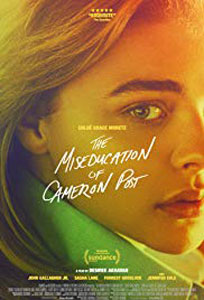Politics follow predictable historical cycles, but even political science experts must be amazed by how quickly mainstream public opinion has switched from “Gay people have a problem that needs to be fixed” to “Someone’s sexual orientation is no big deal.” At the start of Obama’s presidential term, his safe political play was to oppose equal treatment of gays under the law; eight years later, the opposite had become the case.
“The Miseducation of Cameron Post” reminds us how recently homosexuality was an issue on which an opinion was required. The film is set in 1993, but it’s based on a 2012 young-adult novel by Emily M. Danforth, and the author drew from a real-life incident in 2005.
The titular teenager (Chloe Grace Moretz) is sent to a gay conversion camp by her well-meaning guardian, Ruth (Kerry Butler). If “Miseducation” is nominally a teen rebellion movie, then Cameron is the tamest rebel in the genre’s history. (Admittedly, if a guy and girl were caught making out at this camp, they’d probably get merit badges. And in a place where non-Christian music cassette tapes are banned and where monitors poke flashlights into dorm rooms at night, there is little opportunity to stick it to The Man.)
Cameron is morose, but she’s also respectful of her teachers and fellow students, and her uncertainty about the notion of gay conversion is simply that. The script by Desiree Akhavan (who also directs) and Cecilia Frugiuele tracks Cam’s gradual realization that a camp that teaches kids to hate themselves is pretty messed up.
In other words, we’re waiting for the main character to catch up with where we are from the beginning. That’s not a big problem, though, because Moretz sells the hell out of the material with her soft features and innocent performance.
And the slice-of-life approach works in the movie’s favor because there are so many tasty slices: It’s a peek at 1993 (including an impromptu karaoke performance of “What’s Up?”), at evangelical Christianity, and at the gay-fear era. It portrays a worse time that’s ironically a more innocent time. (To clarify: I’m aware that gay-conversion camps still exist today, but my argument here is that society now sees them as shameful institutions. In 1993, Cameron herself would be seen as shameful by many.)
“Miseducation” is also a tragic love story, as Cam’s mind escapes to memories of makeout sessions with her girlfriend, Coley (Quinn Shephard). (It’s deeply ironic that teen sexuality is not an issue here, but simply the orientation of that sexuality.) And it’s a sweet friendship yarn, as Cam bonds with Jane (Sasha Lane) and Adam (Forrest Goodluck). The trio has excellent chemistry, and their hikes in the woods make me want to rewatch “Higher Ground,” a TV show about teens whose problems go beyond societal expectations.
I’m not sure if it’s a strength or weakness that “Miseducation” lacks a plot or character arcs (unless you count Cam’s inner journey). The film simply shows us how it is at this camp, via a vibrant cross-section of students, from those who are enthused by the idea of “correcting” their sexual orientation (Emily Skeggs’ Erin), to those who loathe their own guts (Owen Campbell’s Mark).

And its portrayal of evangelical Christianity jibes with what I’ve seen. I had a group of Christian friends once, and although some of them are still good friends of mine, their religion was generally a wall more so than a doorway if you didn’t convert.
Many moments illustrate this irony. Cameron confides in Mark that she feels phony when praying to God. He says everyone does. She admits she probably doesn’t have faith. He says faith is the key. It’s clear that Cameron will never hear “It’s OK to just be who you are,” which of course would be the healthy outlook and would basically solve everything.
That said, “Miseducation” isn’t simply an outlet for a viewer to rage against emotional abuse of children; it’s not Religion-is-Evil porn. Granted, it has a sometimes slimy villain in Dr. Marsh (Jennifer Ehle), but at least she believes she is doing the right thing; she’s not running a scam to bilk socially conservative parents. Reverend Rick (John Gallagher Jr.) is more nuanced: He has “successfully” undergone the conversion process — although we have only his word on that.
“Miseducation” leaves a viewer hanging on everyone’s situation. (Perhaps the film’s 2018 competition in the gay-conversion-camp subgenre, “Boy Erased,” ratchets up the drama.) But it does show, at least, that young people – even if they don’t grasp the nuances of politics and societal norms – can still possess an ingrained sense of when they are being mistreated. The fact that Cam, Jane and Adam come to their epiphany without having to burn down the world is refreshing, actually, even if this approach does make “The Miseducation of Cameron Post” more ephemeral than the recently bygone era it portrays.

